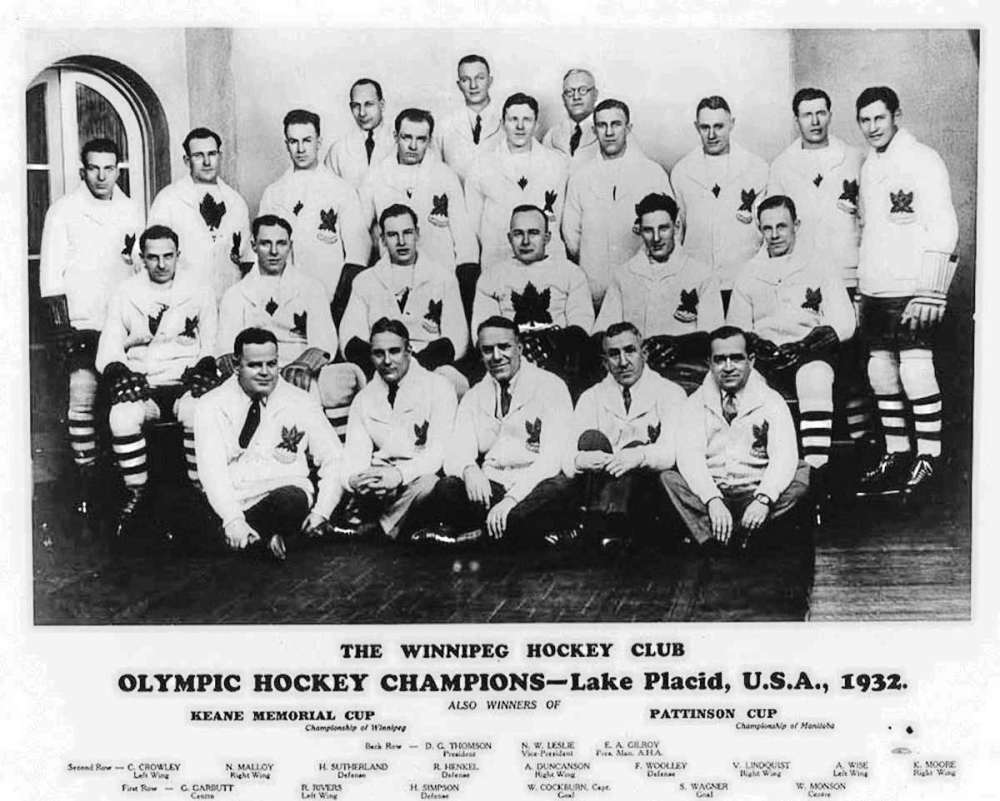When the Winnipegs won Olympic hockey gold
Advertisement
Hey there, time traveller!
This article was published 07/02/2022 (1381 days ago), so information in it may no longer be current.
Canada won ice hockey gold at the first four Winter Olympic Games. Teams from Winnipeg won two titles, with the Falcons winning in 1920 and a team just called Winnipeg Hockey Club, or the Winnipegs, in 1932.
The triumph of the Falcons has been well-documented, most recently in two new books. Golden Boys, by Paul Keery with illustrations by Michael Wyatt is aimed at young readers. A Confluence of Destinies, by Winnipeg author David Grebstad was published on Jan. 19.
A lengthy article of the history of the Falcons club was featured in the 2020-21 Hockey Hall of Fame official induction program, Legends, which was published last November when the 2020 HOF class was honoured with a delayed ceremony in Toronto. The writer was this columnist.

With the 2022 Olympics underway in Beijing, now seems to be the right time to remember the Winnipegs’ victory that took place 90 winters ago. The tournament was played in Lake Placid, N.Y. from Feb. 4 to 13. The team from Winnipeg had earned the right to represent Canada by winning the 1931 Allan Cup, emblematic of the Canadian senior championship. The Winnipegs beat the Eastern champion Hamilton Tigers in two games straight.
At the 1928 Winter Olympics in Switzerland, 10 European teams competed along with Canada. Four years later, the Great Depression greatly affected the number of European teams that could afford to afford to travel to the United States. The fact they likely would have had little success against the Canada and the U.S.A. may have also influenced their decisions. After lobbying by the Americans, Germany and Poland sent teams. The format was a double round-robin with each team playing the others twice. The majority of games were played in extremely cold weather on an outdoor rink located inside the speed skating oval.
Canada opened play with a 2-1 double-overtime win over the U.S.A. Hack Simpson and Vic Lindquist, with the winner, scored for Canada. The Canadians then knocked off Germany 4-1, with Walter Monson scoring twice and Norm Malloy and Stoney Wise adding singles.
The difference in ability between the North Americans and the Europeans was emphasized by the scores of other games. In the second match against Germany, Canada won 5-0 with captain Bill Cockburn getting the shutout. Canada then dominated Poland 9-0, with Cockburn again in the nets. In his only start, Stanley Wagner shut out Poland 10-0. The United States scored 15 times in two shutout wins over Germany and in two victories over Poland scored nine and gave up just one goal.
Canada and the U.S.A. met for the second time on the final day of play with the gold medals up for grabs. The final was played in the indoor rink. Doug Everett scored early in the first period for the U.S.A., but Simpson tied it up over nine minutes into the 15-minute period. The States went back on top late in the second on a power play goal by Winthrop Palmer. Late in the third, it appeared the Americans were on their way to victory and a tie in the standings, but Romeo Rivers scored his fifth goal of the tournament for the Winnipegs with just 33 seconds left on the clock.
Under Olympic rules, the teams would play a maximum of 30 minutes of overtime and if they were still tied, the game would be declared a draw. Canada and the U.S.A. then battled through three 10-minute overtime periods with no scoring. The 2-2 tie earned Canada the gold medals with 11 points from a maximum of 12 while silver went to the U.S.A. with nine points.
Canada essentially went with eight regular skaters in the tournament. Monson led the team in scoring with seven goals and four assists while his linemate Lindquist finished with three and six. Hugh Sutherland and Roy Hinkel were the regular defencemen, playing all six games with Sutherland contributing six points and Hinkel three. Bert Duncanson, George Garbutt, Ken Moore and Cliff Crowley all got into one game. Jack Hughes was the coach.

T. Kent Morgan
Memories of Sport
Memories of Sport appears every second week in the Canstar Community News weeklies. Kent Morgan can be contacted at 204-489-6641 or email: sportsmemories@canstarnews.com
Our newsroom depends on a growing audience of readers to power our journalism. If you are not a paid reader, please consider becoming a subscriber.
Our newsroom depends on its audience of readers to power our journalism. Thank you for your support.




